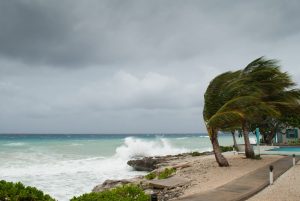Hurricanes like Harvey and Irma probably won't be the last big storms to hit the U.S. this season. So even if you've avoided the current problem—or at least coped with it—you need to know what's likely to happen when the next big one hits.
Airlines
All airlines follow the same general pattern: If your flight is scheduled to/from an airport within a specified impact zone within a stated period, you can rebook an available seat to the same destination in the same cabin with no change fee and at the same fare, up to a certain date. If you want to reschedule a flight beyond that date, you face a change fee and rebooking at whatever the going fare is at the time.
Airline policies generally say you "may" be subject to a change fee rather than you "will" be charged, but that sort of vague proposition doesn't help with post-hurricane planning. And our guess is that most travelers "will" have to pay. In effect, you're no better off than if you had cancelled the flight, yourself.
Although all airlines follow the same general policy, details differ. The most significant detail is how long you have to take a replacement flight without triggering a fare difference or change penalty. Even the most generous of these policies is extremely tight for many travelers. If your cancelled Texas trip was to visit friends or relatives, for example, presumably they would need more than a couple of weeks to recover from any substantial damage to their homes or disruptions of their lives. And local hotels and resorts may well take months to recover.
Obviously, if you need to get to your destination ASAP, even up to a week or two late, and if your original ticket is at a good fare, take the airline's no-fee, short-term rebook option. The downside may be limited availability of replacement seats. But if you don't have a great fare you want to lock in, by all means, forget about immediate rescheduling and get a full cash refund: You have a lot more flexibility about rescheduling.
RELATED: How to Get a Refund on a Nonrefundable Ticket
Cruises
Hurricanes do their maximum damage on seacoasts, which means that Atlantic and Gulf cruise ports are likely to be impacted. If you're on a cruise scheduled to leave from a flooded seaport, presumably your cruise line will either reschedule your cruise for another time or port or offer you a credit toward a future cruise.
Unlike airlines, cruise lines have wide loopholes in their contracts that allow them to change itineraries without your right to a refund. Accordingly, they're unlikely to offer an actual refund, which squeezes you to accept the cruise line's offers or options. And that can be sticky: Some cruise credits require that you rebook a substitute sailing within six months, which is not practical for many travelers.
Given how stingy cruise lines are when dealing with irregular operations, consider trip-cancellation insurance (TCI) when you buy a cruise, even if you don't normally buy it.
Hotels and Vacation Rentals
Big hotel chains don't really do proactive cancellations and re-bookings due to weather. An inquiry to one giant hotel chain asking specifically about cancellations and refunds returned a bland statement about support for victims and nothing at all about cancellations and refunds. I saw about the same sort of statement from HomeAway, a giant vacation rental agency: It "reminds" travelers to contact property owners to "discuss rescheduling or refunding the stay."
Clearly, I found nothing specific or even reassuring from any hotel or vacation rental source. Basically, you're on your own to negotiate the best deal you can with the property. To avoid risk, buy TCI.
RELATED: Travel Insurance Coverage: 13 Things Your Policy Won't Cover
Travel Insurance
In an event such as Hurricane Harvey, TCI can minimize financial risks. Natural disasters such as hurricanes are a "covered reason" for cancellation on almost all policies, and they pay whatever you can't recover from an airline, cruise line, hotel, or vacation rental. TCI is especially important in the case of a cruise, prepaid resort, or vacation rental, where your right to a refund, if any, is limited by a supplier's typically unilateral and self-serving policies.
One problematic area in TCI is common to most policies: Typically, TCI policies limit coverage to circumstances, even covered reasons, that are "unforeseen" at the time you buy the policy. So if you buy TCI when a tropical depression in the Atlantic or Gulf has already headed toward landfall somewhere along the coast, maybe even with a diagram from the National Weather Service, "foreseeable" is problematic.
For maximum protection and minimum risk, buy TCI as soon as you make a substantial nonrefundable payment, and buy it from a third-party insurance agency, not from the airline, cruise line, or tour operator—the coverage is better. If you really want to minimize risk, buy a "cancel for any reason" TCI policy.
More from SmarterTravel:
- The One Thing You Should Never Do With Your Boarding Pass
- How Much to Tip Hotel Housekeeping
- 11 Secret Italian Villages to Visit Before the Crowds Do
Consumer advocate Ed Perkins has been writing about travel for more than three decades. The founding editor of the Consumer Reports Travel Letter, he continues to inform travelers and fight consumer abuses every day at SmarterTravel.
Read the original story: Hurricanes and Travel: What We Learned from Hurricane Harvey by Ed Perkins, who is a regular contributor to SmarterTravel.






